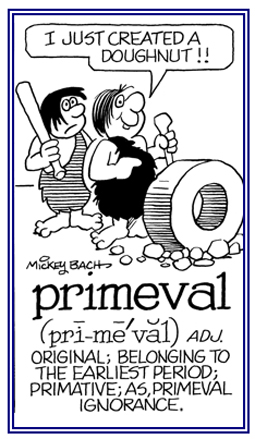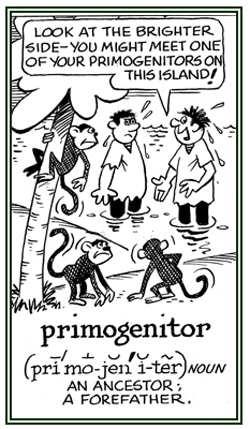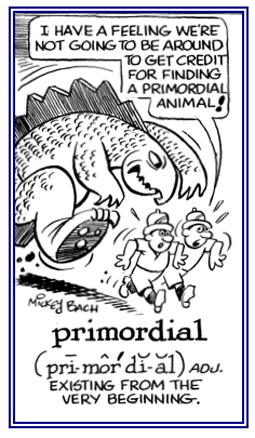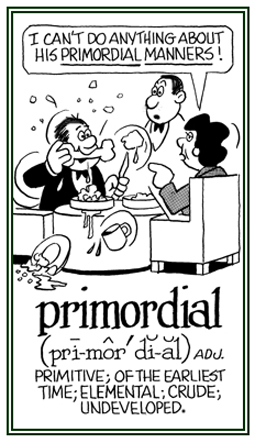prim-, primi-, primo-
(Latin: first, chief, foremost; of first rank)
1. A basic or introductory text to a subject for students just starting to study a topic: Mrs. Hillman distributed several primers to the students before they started studying biology.
2. With home repairs, a basic undercoating applied before painting a surface used to seal the surface and ensure a quality outcome: When Carol was redecorating her home, she used a primer before painting the new bookshelves.
2. With home repairs, a basic undercoating applied before painting a surface used to seal the surface and ensure a quality outcome: When Carol was redecorating her home, she used a primer before painting the new bookshelves.
primeval (adjective), more primeval, most primeval
1. A reference to having existed from the beginning; the earliest or original stage or condition: Jim and his family were able to visit what some considered the primeval forest which had been in the location for hundreds of years.

© ALL rights are reserved.
Go to this Word A Day Revisited Index
The cave drawings which were discovered by the scientists provided a glimpse into the primeval lifestyle of the early inhabitants of the area.
2. Pertaining to a primitive reaction or arising from instinct rather than from thought: Maggie had a primeval urge to strongly respond to her brother's criticism.

Go to this Word A Day Revisited Index
so you can see more of Mickey Bach's cartoons.
primevally (adverb), more primevally, most primevally
Relating to that which is ancient, very old, or originating in the earliest of times and possibly obsolete: It was difficult for the technologically savvy generation of students to relate to the school house in the museum, which seemed to be primevally equipped with blackboards, chalk, etc.
primigenial (adjective) (not comparable)
Descriptive of or characteristic of being the first born; original; or basic: Hazel's primigenial birth order in her family meant that she was the initial child and so she was the oldest of three children.
1. An obstetrical term to indicate the first pregnancy of a woman: Dr. Younge at the hospital completed the form, "Statement of Live Birth", indicating primigravida for Irene, the patient.
2. Etymology: from modern Latin (feminine), from Latin primus, first" + gravidus, "pregnant".
2. Etymology: from modern Latin (feminine), from Latin primus, first" + gravidus, "pregnant".
A substance which prepares something for use or action, in particular: gunpowder that is used to set off an explosive device: Jerome used a small amount of priming to ignite the main explosive charge of his antique rifle.
A medical term referring to a woman who has given birth to her first or to just one child: Nancy, the primipara, who had been admitted to hospital and had given birth to her first baby, was understandably nervous and the nursing staff made efforts to reassure her that she and the baby would be fine.
primiparous (adjective) (not comparable)
Descriptive of a woman who is expecting or has just given birth to her first child: Sally was the happiest primiparous patient in the hospital.
1. People who belonged to ancient or "uncivilized" groups: Dwight and other archaeologists are still in the process of learning more about Stone Age primitives.
2. An artist who produces art in a simple style which is often childlike: There are some art exhibitions that actually present shows of primitives that have been created by some painters.
2. An artist who produces art in a simple style which is often childlike: There are some art exhibitions that actually present shows of primitives that have been created by some painters.
primitive (adjective), more primitive, most primitive
1. Descriptive of that which is simple, unsophisticated, or basic; and does not show much skill: The primitive tools that were used in the early years of humans were very easy to use and were not complicated.
2. Relating to a preliterate, nonindustrial society or culture: Primitive people often lived in what is characterized as unorganized social and economic conditions.
3. Pertaining to some things that are made or done in a way that is not modern and which does not show much skill: The technology that was used to build the Wilson's house on the island was primitive and outdated.
4. A reference to a part of a person which is wild or like an animal and not based on reason: Some people are convinced that the killing of the "surplus" giraffe at the Copenhagen Zoo is a primitive action and death threats have been made to kill such "primitive behavior" by the zoo keepers.
2. Relating to a preliterate, nonindustrial society or culture: Primitive people often lived in what is characterized as unorganized social and economic conditions.
3. Pertaining to some things that are made or done in a way that is not modern and which does not show much skill: The technology that was used to build the Wilson's house on the island was primitive and outdated.
4. A reference to a part of a person which is wild or like an animal and not based on reason: Some people are convinced that the killing of the "surplus" giraffe at the Copenhagen Zoo is a primitive action and death threats have been made to kill such "primitive behavior" by the zoo keepers.
primitively (adverb), more primitively, most primitively
Relating to the behavior of someone or groups of individuals that are unsophisticated, plain, or of a basic kind of existence: The members of a primitively remote tribe of islanders lived in a very simple fashion because all they had to eat came from fishing and the fruit from the trees to meet their essential physical needs.
A state of natural wildness that is untamed and unsophisticated: During the summer camping trip, Jim and his family all lived in a state of primitiveness for more than a month by sleeping under the stars, wading in the streams, catching fish, and searching for wild fruit; all without any electronic technology.
1. An ancestor; especially, the earliest ancestor of a people or of another group: Adam was studying the history of the various primogenitors of England's royal family, going back in history to the time of the Middle Ages.
2. Someone who lived earlier in a person's line of descent: Cleo was interested in learning more about the primogenitors who came to America from Great Britain.

© ALL rights are reserved.
Go to this Word A Day Revisited Index
2. Someone who lived earlier in a person's line of descent: Cleo was interested in learning more about the primogenitors who came to America from Great Britain.

Go to this Word A Day Revisited Index
so you can see more of Mickey Bach's cartoons.
1. The legal or customary right of inheritance or succession by the firstborn son of a family: Because he and his wife only had daughters, Lord Seymore was puzzled about the custom of primogeniture in terms of the family estate.
2. The patrilineal mode of succession by which the right of inheritance pertains to the firstborn son of a family, to the exclusion of females: In older times, the lord of an estate might legally adopt a male child in order to preserve the custom of primogeniture when determining the terms of his will with respect to the inheritance of his property.
3. Etymology: from Latin, “firstborn”; from primus, “first” + genitura, “birth”.
2. The patrilineal mode of succession by which the right of inheritance pertains to the firstborn son of a family, to the exclusion of females: In older times, the lord of an estate might legally adopt a male child in order to preserve the custom of primogeniture when determining the terms of his will with respect to the inheritance of his property.
3. Etymology: from Latin, “firstborn”; from primus, “first” + genitura, “birth”.
primordial (adjective), more primordial, most primordial
Descriptive of something that has existed since the beginning of time, or is ancient, whether it was geological or biological: Saber Toothed Tigers are among the primordial animals that once roamed North America millions of years ago.

© ALL rights are reserved.

© ALL rights are reserved.
Go to this Word A Day Revisited Index
There have been some primordial forests, some of which are now being destroyed by modern humans.




